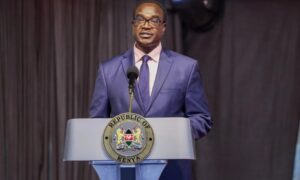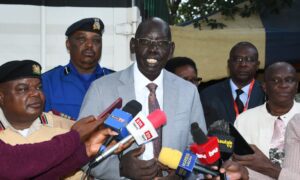The High Court has suspended a controversial directive issued by Acting Inspector General of Police, Douglas Kanja, which sought to prohibit public demonstrations within Nairobi’s Central Business District (CBD) and surrounding areas.
In a ruling that reaffirmed the constitutional right to peaceful assembly, Justice Bahati Mwamuye issued a conservatory order halting the enforcement of the ban. The decision followed a petition filed by the Katiba Institute, a legal advocacy group known for championing constitutional rights. The suspension will remain in place pending the full hearing and determination of the case.
Court Rejects Police Restrictions on Protests
Kanja’s directive, which sparked criticism from civil society groups and human rights organizations, had not only banned demonstrations in the CBD but also imposed a new requirement that all protests must have an appointed leader. The National Police Service argued that this measure was necessary to enhance accountability and maintain public order.
However, Justice Mwamuye dismissed this justification, stating that the directive failed to meet the constitutional threshold. The court emphasized that Kenyans have the right to assemble peacefully, with or without a designated leader, as guaranteed under Article 37 of the Constitution.
“The right to peaceful assembly is a fundamental freedom enshrined in the Constitution. Any attempt to limit this right must meet strict constitutional and legal standards,” Justice Mwamuye ruled.
The decision was welcomed by human rights activists, who had decried the directive as an attempt to curtail civil liberties under the guise of law enforcement.
Katiba Institute Challenges Directive in Court
The Katiba Institute, which filed the petition, argued that Kanja’s directive was unconstitutional and amounted to an arbitrary attempt to limit freedoms protected by law. In its submissions, the institute stated that the directive contravened the spirit of democracy and was a direct attack on citizens’ rights to freely express their views through peaceful protests.
“The Constitution does not require protesters to have an appointed leader. This directive was an unlawful move to deter demonstrations, especially those critical of government policies,” said the legal team representing Katiba Institute.
The petitioners further argued that the directive created unnecessary legal barriers that could be used to criminalize protests, potentially discouraging Kenyans from exercising their democratic rights.
What This Means for Future Demonstrations
The ruling is a major setback for the police, who have frequently been accused of using excessive force to disperse protests. It sets a legal precedent that could influence future cases involving public demonstrations, particularly in Nairobi, where protests often attract heavy police presence.
Legal experts believe that this case will test the balance between law enforcement’s duty to maintain public order and the public’s right to demonstrate. If the High Court ultimately declares Kanja’s directive unconstitutional, it could limit the ability of police to impose restrictions on protests in the future.
Political analysts have also weighed in, suggesting that the directive may have been motivated by recent protests against government policies, including taxation, corruption, and governance issues.
Public Reactions and Government Response
Civil society organizations have praised the ruling, calling it a victory for democracy. The Kenya Human Rights Commission (KHRC) and Amnesty International Kenya issued statements applauding the court for upholding constitutional freedoms.
“This ruling sends a clear message that government agencies cannot arbitrarily limit constitutional rights. Citizens have the right to voice their concerns without fear of police intimidation,” KHRC said in a statement.
On the other hand, sources within the National Police Service hinted that they may appeal the decision, arguing that uncontrolled demonstrations pose security risks, including potential damage to property and public safety concerns.
As the case proceeds, legal experts advise that the government should focus on facilitating peaceful protests rather than attempting to ban them. The suspension of Kanja’s directive signals the judiciary’s continued role in safeguarding democratic principles in Kenya.
With Nairobi frequently serving as the epicenter of demonstrations, the ruling is expected to shape how future protests are policed in the country.
Conclusion
The High Court’s decision to suspend IG Douglas Kanja’s protest ban is a significant win for civil rights groups and protest organizers. As legal proceedings continue, attention will now shift to the full hearing of the case, which will determine whether the directive is permanently quashed.
For now, Kenyans retain their constitutional right to assemble and protest peacefully, with or without an appointed leader—a reaffirmation of the country’s commitment to democracy and free expression.




















